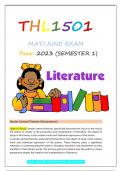Other
THL1501 MAY/JUNE EXAM ANSWERS 2023
- Course
- THL1501
- Institution
- University Of South Africa (Unisa)
In this discussion, we explored the concept of intentionalism in literary theory. Two main forms of intentionalism were examined: moderate intentionalism and radical intentionalism. Moderate intentionalism suggests that the author's intentions should be considered alongside other factors, such as t...
[Show more]



